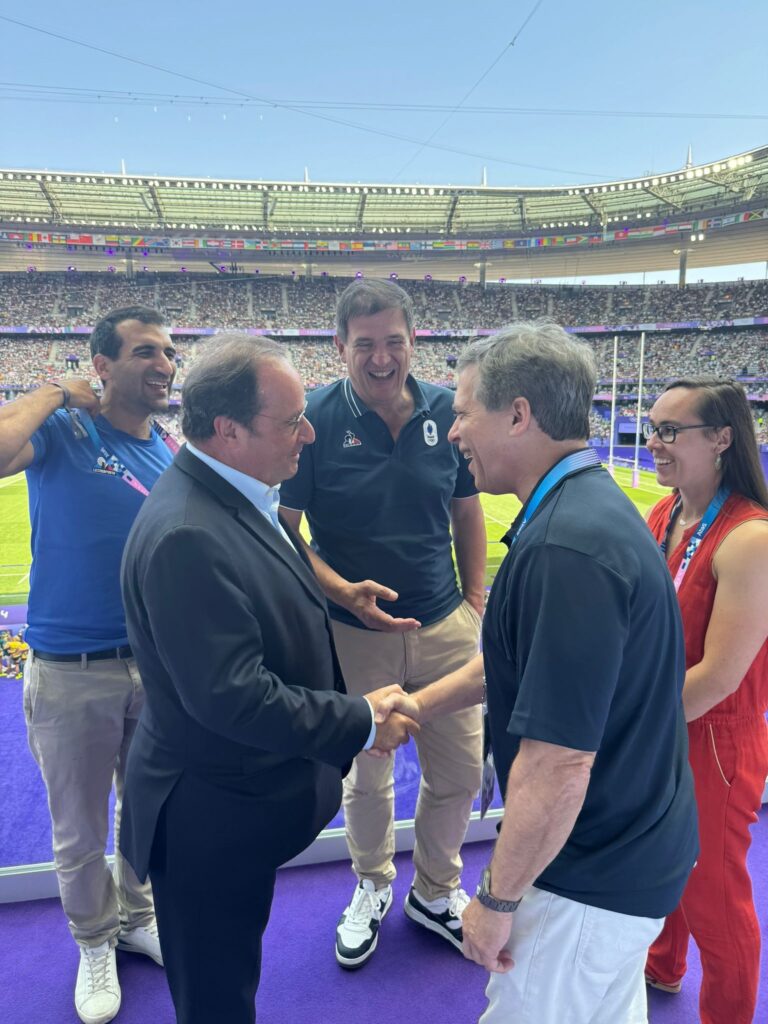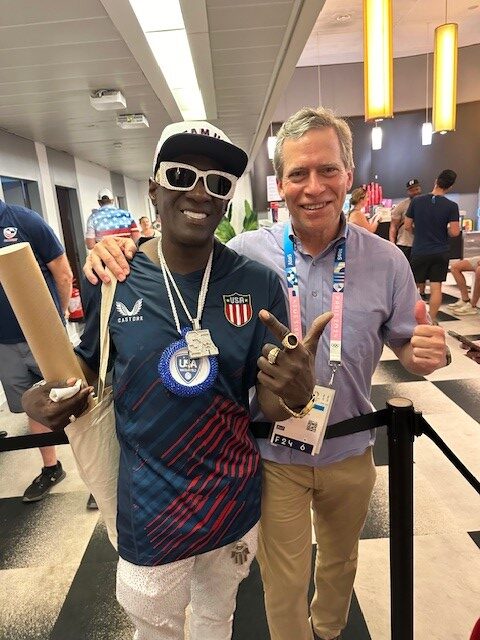There is a certain cynicism that escalates on the eve of every Olympics, particularly in the host city. The residents flee, fearing that their city will be overrun and inoperable. Laments about the cost versus the benefits of hosting such a large-scale event proliferate. And concerns about security and health remain front and center. Yet every Olympics I have attended — Paris 2024 being my fifth — take on a life of their own, and by the end they make believers of most of the cynics. In Paris, however, it took only two days.
The ambitious and unique plan for the opening ceremonies, with athletes on boats parading down the Seine, caused an extensive security perimeter that had to be navigated by the locals and tourists alike. France also found itself immersed in politics as divisive as those in the United States. Many Parisians were at best ambivalent about the Games, though at least one notable exception was the cheerful volunteer force that is always crucial to making them run smoothly.

Being involved with the sport of rugby, I arrived in Paris the Tuesday before the opening ceremonies (and the day before the start of the rugby competition), having been seated on the plane from Dallas behind Nadia Comăneci. Nadia was met by six handlers. I was met by six fewer.
Starting on the Friday of the opening ceremonies, three things happened that turned the tide. The first was that the opening ceremonies proved to be spectacular — uniquely French, audacious and remarkably coordinated across so many points along the Seine. The feeling among the locals was: “Well, that may have been worth it!” The second occurred the next day when the French men’s rugby team won the first team gold medal of the Games before a packed stadium of 70,000 people. The roar of that crowd was deafening, and all divides were temporarily shelved in favor of celebration. And the third was that by Sunday — two days after the opening — the barricades that had restricted movement around the Seine for many blocks were removed, and Parisians could travel around, revel in their city and act as magnificent hosts for the 11,000 athletes and countless tourists who came together as a global Olympic family really for the first time in eight years. It was a joyous, celebratory and inspirational feeling.
The venues included many iconic Parisian sites that were transformed for Olympic events: equestrian competition in Versailles, fencing at the Grand Palais, archery at Esplanade de Invalides. The pop-up beach volleyball stadium in the shadow of the Eiffel Tower gets my vote as one of the Olympics’ all-time great venues. The Seine managed to rid itself of its “Eww!” factor just in time for open water competition. Simply put, nobody does Paris like Paris does Paris.
My observation that the domestic issues in France were tabled for 16 days was confirmed in virtually every interaction with a local. One example occurred at lunch overlooking the Seine next to two American expats who had just returned to Paris at the beginning of the second week of the Olympics, having cleared out while the preparations for the opening ceremonies took place. They marveled at the “positive energy” that had overtaken the city. And why not? You had some of the most compelling competition and exemplary athletes inspiring each other and pushing each other to greatness.
There was indeed greatness. It is difficult to measure such things but I’m not sure there have ever so many consensus GOATs assembled and competing in one city at the same time — Simone Biles, Novak Djokovic (who at age 37 won an epic battle against 21-year-old Carlos Alcaraz for the men’s tennis gold medal), Sifan Hassan, LeBron James, Katie Ledecky and Sydney McLaughlin-Levrone, who is well on her way to GOAT status in any event that involves a lap around a track, hurdles or no hurdles. The fact that Michael Phelps and Tom Brady were on hand to watch other GOATs added to the mix. GOATs truly appreciate GOATs.

Even the celebrities at the Olympics were not there gratuitously as hangers-on. Snoop Dogg added a unique garnish to the proceedings. Flavor Flav (pictured left) enhanced the profile of the U.S. women’s water polo team and then crossed the bridge from that venue to Stade de France to be on hand to celebrate the U.S. women’s rugby team winning a bronze metal. His congratulatory remarks to the team were eloquent and efficient: “You did the damn thing!” Tom Cruise was more than just a spectator, assuming you view rappelling from the top of Stade de France down to the field as being more than a spectator.
Such a cauldron of athletic excellence being on full display seems to be inspiring non-Olympic athletes to try to find their way in. Bryce Harper, among others, is advocating for Major League Baseball to get its act together so that MLB players can take a hiatus during the 2028 season and play for their national teams in the L.A. Olympics – something the WNBA was able to do for Paris, which led to a gold medal for the U.S. women’s basketball team. Micah Parsons of the Dallas Cowboys has expressed his interest in trying to find some sport (other than flag football, which will debut in 2028 in Los Angeles) that would allow him to become an Olympian. Might I suggest rugby, Micah?
There are vignettes from these Olympics that are sticking with me. Having been involved starting in 1996, with the effort to get rugby sevens into the Olympics and culminating in its debut in Rio in 2016, the U.S. women’s last-minute victory over Australia in the bronze medal game was as emotional as it gets as it fulfilled a vision that I had in my head all of those years. And thank you for your support, Flavor Flav.
I was sitting above the finish line of the men’s 100 meters, which provides the most dramatic 10 seconds in sports every four years. A 70,000-seat stadium is deadly silent until the gun goes off and then erupts for 10 seconds (or in this case, 9.79). When seven of the eight sprinters in Paris crossed the line within 9/100ths of a second of each other, we spectators were looking at each other trying to figure out who won. It may have been the most competitive, world-class 100 meters race ever run, with Noah Lyles getting the nod by .005 seconds.
LeBron James exalting and celebrating Stephen Curry’s effort to escape with a victory against Serbia in the men’s basketball semifinal was an emotional display between historic rivals that you don’t often see. And Simone Biles and Jordan Chiles bowing down to the resilient and underappreciated Rebeca Andrade of Brazil on the podium after the women’s floor exercise was a tribute to the spirit of the Olympics that cannot be erased no matter what the “Suits” do with Chiles’s bronze medal.
After a peaceful, harmonious coming-together of the greatest athletes in the world, including in sports we seldom see, the question arises that was posed when Forrest Gump stopped running: “Now what are we supposed to do?”
Well, one hope I have for those Parisians who fled town and missed the repurposed venues and the celebration of excellence and inspiration provided by these athletes is that upon arrival back in Paris they took a chance in to see it all unfold again at the Paralympics. If you believe Olympians have compelling back stories, familiarize yourself with the back stories of Paralympians. Meanwhile, we Americans can look forward to matching the efforts of the French hosts when the Olympics come to Los Angeles in 2028, which will no doubt be staged in a completely different way. I expect the cynicism to creep in again as those Olympics approach, but it will prove no match for the Olympic spirit which, though subdued for eight years, is now burning bright.
Bob Latham is a partner at Jackson Walker LLP in Dallas and a member of the Executive Board of World Rugby.
